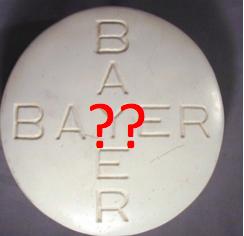
Aspirin, aka acetylsalicylic acid (ASA), was "born" in Germany in 1899. Now, 119 years later, it may not have died in Germany, but it got smacked around pretty badly at the 2018 European Society of Cardiology in Munich (1). In a Hot Line - Late Breaking Clinical Trials presentation Dr. J. Michael Gaziano of the Brigham and Women's Hospital in Boston said:
"Aspirin did not reduce the occurrence of major cardiovascular events in this study. However, there were fewer events than expected, suggesting that this was in fact a low risk population. This may have been because some participants were taking medications to lower blood pressure and lipids, which protected them from disease."
It is too late to write the obituary for the drug, which was originally developed as an analgesic (2) and antipyretic and later used to prevent colon cancer as well as strokes and heart attacks; the question has not been answered entirely.
Aspirin's use for prevention of cardiovascular events has been controversial, but most physicians suggest that patients who are at risk for heart attacks or stroke take a baby aspirin (81 mg) every day or two. The U.S. Preventive Services Task Force recommends the following uses of low-dose aspirin.
- For the prevention of cardiovascular disease and colorectal cancer in adults aged 50 to 59 years who have a 10% or greater 10-year cardiac risk and are not are not at increased risk for bleeding.
- The evidence for prevention is weaker for people aged 60 to 69. The USPSTF says that the decision should "be an individual one."
- There is insufficient evidence for the use of aspirin for primary prevention in adults younger than 50 or older than 70.
The data
The 'Aspirin to Reduce Risk of Initial Vascular Events" (ARRIVE) trial, was initiated ten years ago to study whether aspirin would reduce the risk of an initial cardiovascular event in patients thought to be at moderate CV risk. A total of 12,000 adults (3) with one or more risk factors for a coronary event but had not experienced an "event" previously, were given a daily dose of 100 mg of aspirin.
- 4.29% of the people who received aspirin died
- 4.48% of the people who received placebo died
- There was no effect on other measures of coronary health - heart attacks, angina, and stroke.
- But people who took the aspirin experienced twice the gastrointestinal bleeding than those in the placebo group (although the numbers in both groups were low).
So, is it time to toss the pills? Some will, but there are a few factors that suggest that the final story may not have been told.
- The participants of the trial turned out to be at a lower risk (less than 9%) than that which was calculated (17%) for the group (4).
- There was an improvement in the efficacy of medications for high blood pressure and cholesterol during the interval of the trial (2009-2017). This may be responsible for the difference between the calculated and real risks.
- It is unclear whether the dose was high enough to make a difference. A daily dose of 325 mg (one adult aspirin) has also been recommended.
While ARRIVE made it fairly clear that baby aspirin is not effective in protecting this group of people (5) from heart attacks this does not mean aspirin at a different dose will not work.
There is little doubt that recommendations about prophylactic aspirin use will change, it is less clear how.
NOTES:
(1) The trial was funded by Bayer, yet aspirin still bombed. So much for the "industry-funded" conspiracy theories nonsense, at least in this case.
(2) Aspirin is a synthetic analog of salicylic acid and salicin, both of which are found in willow bark. Neither the salicylic acid and salicin are as effective as aspirin.
(3) No patients with diabetes were included in the trial.
(4) It is possible that there was a hidden effect because the number of events - about 100 in both groups, less than half of what was originally calculated - was not sufficient to conclude positively that there was no benefit in baby aspirin. All we can say is that for 12,000+ patients at 100 mg over the length of the trial there was no effect demonstrated.
(5) Aspirin could conceivably work for people in higher risk groups, such as those who already had heart attacks. This was not intended to be addressed in this trial.



